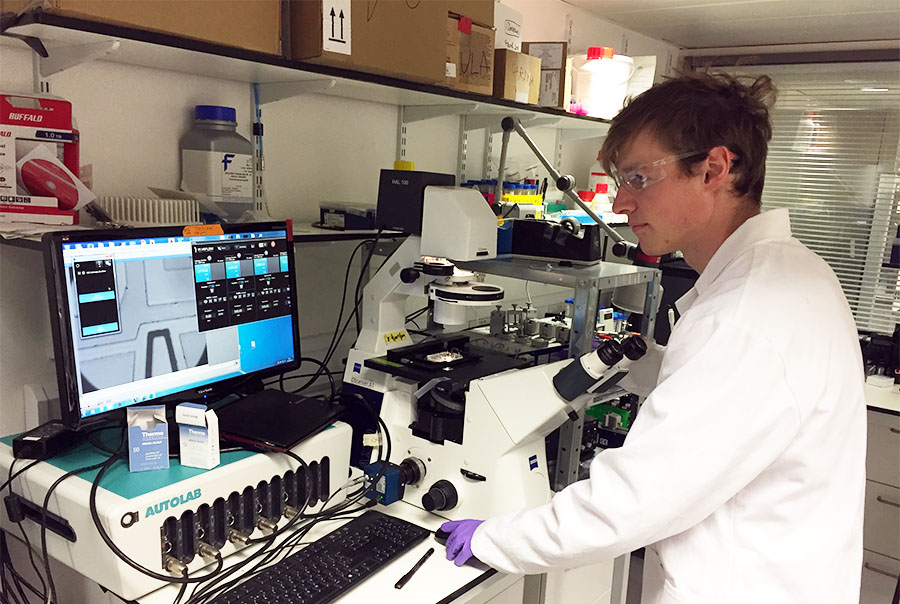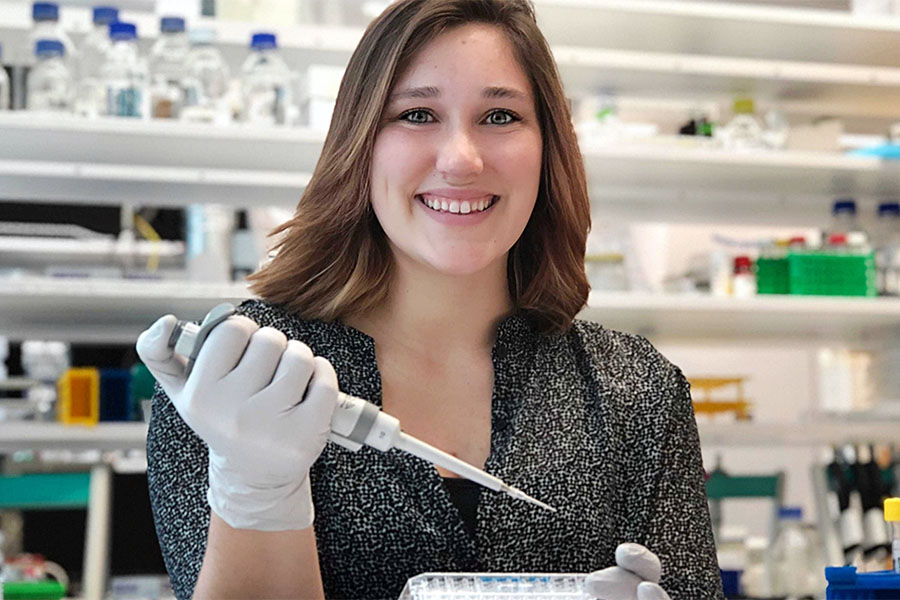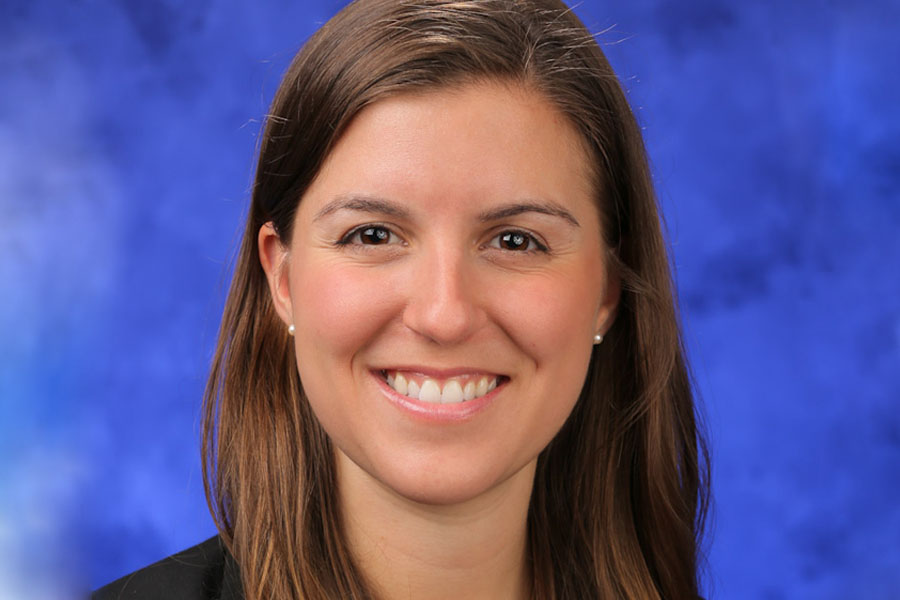NCATS Ignites Translational Science Spark for Young Investigators
Translational Science Highlight
- NCATS partners with universities to train the next generation of translational scientists and help them benefit from international collaborations.
Each day, scientists in the NCATS Division of Preclinical Innovation are hard at work to uncover discoveries that have the potential to become tomorrow’s treatments. In addition to doing exemplary research, many of these individuals are also training and cultivating the next generation of translational scientists.
NCATS sponsors talented Ph.D. students, including several profiled in 2016, through the NIH Graduate Partnerships Program. These exceptional students split their time between an NIH Institute or Center and a host university, receiving mentorship and guidance from researchers at both institutions. NCATS works with each trainee to customize their experiences in ways that will best meet their interests and career goals.
“The Graduate Partnerships Program enables some of the best and brightest young investigators to come to NCATS, and it helps us form new collaborations with the host university,” said Anton Simeonov, Ph.D., NCATS scientific director. “In exchange, we provide these promising scientists — each of whom brings a unique background and fresh perspective — with training in translational research and access to some of the best high-throughput screening facilities and compound libraries in the world.”
Targeting Tumors

David Morse, M.Phil., a graduate student in the NIH Oxford-Cambridge Scholars Program. (University of Cambridge/Department of Chemistry)
For his master’s research at Cambridge University, David Morse, M.Phil., was trying to apply nanotechnology to tumor treatment, using tiny molecular vehicles to deliver anticancer drugs to tumors while leaving healthy cells alone. But Morse realized that researchers had an incomplete understanding of tumors that was limiting to his research.
To help bridge that knowledge gap, Morse is working under the mentorship of Craig Thomas, Ph.D., who leads NCATS’ Chemistry Technology program, and Tuomas Knowles, Ph.D., at Cambridge, as part of the NIH Oxford-Cambridge (OxCam) Scholars Program.
Now in his second year in the Ph.D. program, Morse is developing new techniques to study what genes are turned on in individual tumor cells. Much of what we know about tumors is based on studies that look at the cells in a tumor as a mixture, treating all cells as the same. This approach fails to capture the differences within tumors. Using the technique he helped develop, Morse found that tumor cells in the center of an ovarian tumor are very different from those on the tumor’s surface.
Because the surface cells are more accessible to potential treatments, these results could help researchers design better drugs or ways to deliver existing drugs to ovarian tumors. Morse is now working to improve the new technique to track each cell and pinpoint precisely where each cell was in the tumor at the time of data collection.
So far, Morse has worked not only with teams at NCATS and Cambridge, but also with collaborating laboratories at the Broad Institute and Harvard University.
“Each institution brings their unique strengths to the project, with NCATS really excelling at scaling things up so that we can use this technique on tumors from many different patients,” Morse said.
Advancing Drug Assays

Dorian Cheff is a graduate student in a collaborative doctoral program between NCATS and the Karolinska Institutet in Sweden. (Karolinska Institutet/Qing Cheng)
A desire to explore a career in research brought Dorian Cheff to the NIH post-baccalaureate program after her undergraduate studies at University of Michigan. A chance encounter with Matthew D. Hall, Ph.D., who leads the NCATS Chemical Genomics Center’s biology group, brought her to NCATS.
“I just fell in love with the translational research process and NCATS as a whole,” Cheff said. “The people are great to work with and incredibly passionate about accelerating the way we do science.”
After more than two years of mentorship with Hall, Cheff decided to continue her training as a Ph.D. student through the NIH Graduate Partnerships Program. Cheff and Hall reached out to Elias Arnér, M.D., Ph.D., at the Karolinska Institutet in Sweden, about collaborating on an understudied family of enzymes. One enzyme in the family, glutathione peroxidase, helps cancers survive during stress, such as drug or radiation treatment. Cheff chose the enzyme because it is particularly important in glioblastoma, an aggressive form of brain cancer. Her project is designed to find molecules that block the enzyme and make the cancer more sensitive to existing drugs.
Cheff has been in Sweden since August 2017, working to make glutathione peroxidase in the laboratory and to create an assay (test) to identify molecules that stop the enzyme from working. Once she has refined the assay, she will bring it back to NCATS for testing with the Center’s high-throughput screening robots and equipment. Then she will screen NCATS’ collections of chemicals and molecules to find leads for a potential new drug against glioblastoma.
“A great asset for my project is the collaboration between the medicinal chemists, biologists and informatics specialists at NCATS,” Cheff explained. “We’re all working together to figure out how to make promising molecules work better.”
Combatting Malaria

Kimberly Breglio, D.Phil., a graduate of the NIH Oxford-Cambridge Scholars Program. (Penn State College of Medicine)
Kimberly Breglio, D.Phil., was nearing the end of her medical school training when she decided to take a pause to conduct research. The NIH OxCam Scholars Program was ideal, because she did not have to take more classes or try out different labs before diving into her doctoral research.
Working with Thomas at NCATS and Katja Simon, Ph.D., and David Roberts, D.Phil., at the University of Oxford, Breglio focused on possible ways the malaria parasite becomes resistant to drugs. She found a gene, ATG18, that seemed to be altered in many resistant parasites. Breglio used gene-editing tools to create malaria parasites that had this altered gene so she could study them in the lab. She screened the parasites against NCATS’ compound collections to try to understand why the altered gene seems to be beneficial to the parasite. Researchers at NCATS helped her sift through all the resulting data, which she plans to publish by the end of 2018. Her work will help researchers understand how malaria parasites survive stress, such as exposure to a drug.
“NCATS has been great,” Breglio said. “There is so much cutting-edge research going on, and the multidisciplinary Chemistry Technology group provided many insights into my project.”
Breglio is now completing her medical degree and plans to use her research skills as a clinical investigator to study how tropical diseases affect the skin. Like her fellow trainees working with NCATS mentors through the NIH Graduate Partnerships Program, she is now better equipped for a collaborative and multidisciplinary research career in tackling translational science problems.
Through this and other training programs, NCATS is fostering tomorrow’s translational workforce. Learn more about Translational Science Training at NCATS.
Posted July 2018


